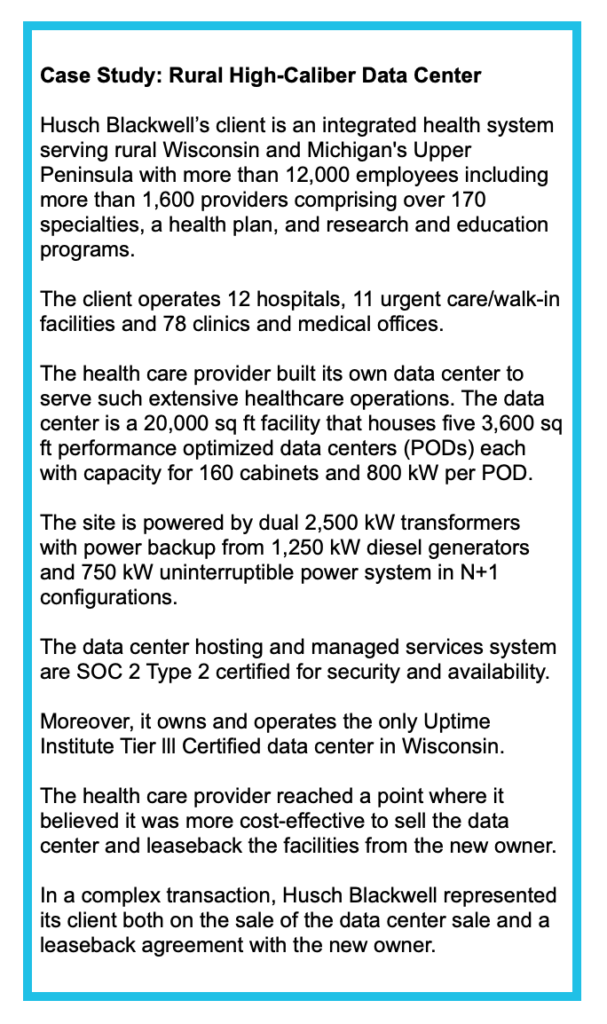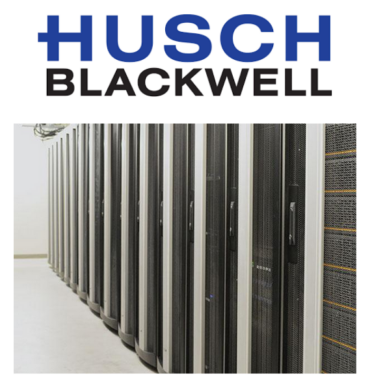Husch Blackwell’s legal practice is increasingly focused on data centers as the upward trend in data center development continues. The firm represents both data center developers and operators who lease space and tenants who occupy that space. Data centers play a critical role in the digital infrastructure ecosystem. Demand is up significantly in 2022 and growth is forecast for 2023.
Different data center types require different approaches
No two data centers are the same in terms of space and power. Husch Blackwell identifies several types of data centers: hyperscale, enterprise single entity, multi-tenant or colocation, and modular edge or micro. With each type comes different zoning and permitting requirements and unique service level agreements (SLAs) between data center owner/operators and tenants.
Edge or micro data centers are a growth area with parallels to the tower business. The idea of using edge data centers is to reduce latency and bring processing power closer to the end user for access to online services and cloud applications. The major tower companies are exploring edge data center deployments, leveraging their tower portfolios to offer proximal connectivity.
Before you break ground
Data centers are commercial real estate, albeit a very niche and expensive use area. More than buying land and erecting a building, there are important considerations for power and water supply, and network connectivity.
Data centers have similar requirements as siting a tower, but with an extra layer of complexity. Siting towers often raise community concerns for safety and aesthetics. Data center building designs are less conspicuous but are more taxing on municipal power and water services. When applying for a data center permit, the first hurdle is to ensure the community understands what is being 
Here are some key considerations: Where does that data center use fall within local zoning codes? Municipalities generally have code provisions in place for tower siting. While communities may welcome a data center, often there is a lack of understanding as to whether it is permitted use or conditional use, or if it fits within the zoning code, many of which were enacted without considering data centers.
First, find a suitable location, ideally with development incentives, and one that aligns with the operator’s business goals. This could be in a technology park or an industrial corridor. A new facility is attractive to the community because it will bring jobs and related benefits. Data Centers also do not strain local services, such as schools, public works, and law enforcement, in a manner similar to other types of development.
Next, what sort of demand is the data center going to place on municipal services, particularly utilities? Data centers consume an enormous amount of power and water.
There are also air permitting issues with facilities that use diesel generators. Depending on the geographical location, certain population centers could become an environmental justice area of concern, which means that the data center operator falls into situations that involve neighborhood notification and public hearings. Data centers involve a whole other layer of different complexities that go beyond what is normally involved with siting towers.
Future data center construction likely will take place in areas where there is more land and access to renewable energy sources. Technology advances are helping data center owner/operators become more efficient. Cooling systems that require less or no water are being used. Solar and wind power is supplementing utility power. Hyperscale cloud providers are using AI to reduce their operating costs.
Colocation services agreements
There may be some tax credits or incentives for restoring a building as a carrier hotel in an established downtown area. What type of structure is being restored? Prospective data center tenants will want to know: What is the condition of the building? What representations and warranties are the data center owner/operator providing that the rehabbed structure is sound? Is the tenant taking the space ‘as is’? What indemnity obligations exist and for what type of acts or occurrences?
The primary rental considerations are for sufficient space, power, cooling, and connectivity, along with the ability of a tenant to expand or contract future rental space. Each subset of that is going to be addressed in a colocation SLA. What kind of uptime does the tenant require and what will the data center operator guarantee? What happens if the data center operator does not meet their SLA? Are there rent credits, or other concessions and give backs? Such points must be considered when drafting and negotiating these types of agreements on behalf of either a data center operator or a tenant.
Know your data center operator
Tenants should know their data center operator. There are some very sophisticated operators who have multiple facilities and have an established market presence, and others who are newcomers to the market. Newcomers often lack a track record of established indemnification provisions, or other important terms and conditions in their SLAs. Husch Blackwell has dealt with myriad agreements with varying levels of sophistication, presented to its clients by data center owner/operators.
Rental rates are going up
Rents are expected to go up in 2023. Annual escalators could be adjusted to higher inflation rates. A tenant in a downtown hotel carrier hotel may not have the ability to relocate to a less expensive facility. The cost of relocating equipment is prohibitive and another nearby facility may not be available. Rent is always an issue and often the primary negotiating point.
Husch Blackwell’s telecom practice has evolved beyond land, towers, and traditional telco infrastructure into the full digital infrastructure ecosystem. The firm helps clients deploy infrastructure throughout the country to ultimately ensure the services that people and businesses need continue to be possible.
It has the experience and resources to resolve such challenging issues with innovative and creative solutions that benefit all the parties involved.
For more information: www.HuschBlackwell.com and listen to our recent Towers Talks podcast featuring Husch Blackwell on this very topic here.
By John Celentano, Inside Towers Business Editor




Reader Interactions